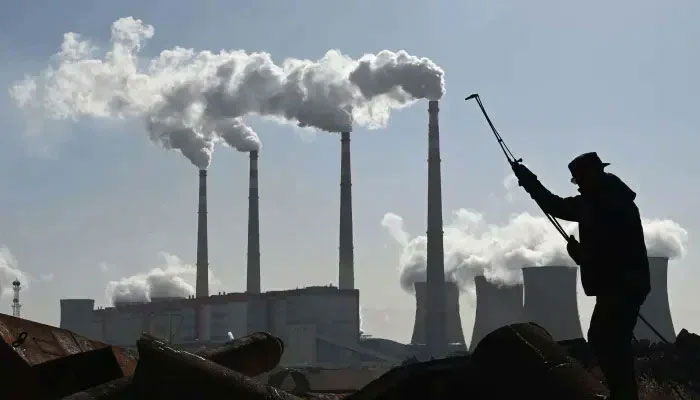EU carbon taxes threaten Pakistan’s exports, experts call for just energy transition
KARACHI: Upcoming carbon taxation measures in European Union (EU) countries could jeopardise Pakistan’s exports if the country continues to rely on fossil fuel-based electricity generation, such as coal, experts warned during an event.
The event was co-hosted by the Policy Research Institute for Equitable Development (PRIED), an Islamabad-based think tank, and the Institute for Climate and Sustainable Cities (ICSC), a Philippine NGO focused on climate and energy solutions.
The experts highlighted the critical role of grassroots and subnational groups in building resilience to climate change and facilitating a just transition to renewable energy sources.
The event drew comparisons between the impacts of energy-related projects in Pakistan’s Tharparkar district and the eastern Visayas region of the Philippines. Experts highlighted the need for inclusive, community-driven approaches to address these challenges and promote sustainable energy practices.
Dr Khalid Waleed, an energy economist, said that Pakistan’s exports to the EU could face significant risks due to the impending carbon taxation measures if the country persists in using coal for electricity production.
“Communities directly impacted by coal-powered energy projects, alongside local governments and industrialists, must collaborate to achieve an inclusive and equitable energy transition,” he added.
Rimsha Rehan, an energy finance analyst, detailed the socio-economic and environmental costs of coal mining and power generation in Tharparkar. She pointed out the severe livelihood losses, health risks and environmental degradation caused by these projects.
Per Rehan: “Women and children, who bear the brunt of land degradation, water contamination and health crises, must be central to decision-making processes for phasing out coal and transitioning to renewables.”
Lidy Nacpil, a senior environmental justice activist from the Philippines, called for substantial financial commitments from the Global North.
“The Global North owes trillions -- not billions -- of dollars to the Global South to support climate adaptation, mitigation, and compensation for loss and damage caused by climate change,” she asserted. Nacpil also stressed the need for local and national governments to include the voices of vulnerable communities in climate action strategies.
Michael Sinocruz, a Philippine government official, highlighted the importance of learning from past policy failures to foster acceptance of renewable energy.
“Awareness campaigns, alternative livelihood options for those impacted by renewable energy projects, and international funding for building climate-resilient communities are essential for transitioning from fossil fuels to renewables,” Sinocruz said.
Romil Hernandez, an environmental activist from the Philippines, underscored the vulnerability of the eastern Visayas region to typhoons and the need for localised climate action. “Local leadership and renewable energy initiatives can reduce coal dependency, save public funds and promote social development,” Hernandez said.
Participants agreed on the importance of empowering subnational actors and community organisations to advocate for and help shape sustainable energy policies. The event concluded with the presentation of a charter of demands for a just energy transition by the Alliance for Climate Justice and Clean Energy (ACJCE), a Pakistan-based network of research institutions, civil society organisations, academics and climate justice activists.
-
 'Too Hard To Be Without’: Woman Testifies Against Instagram And YouTube
'Too Hard To Be Without’: Woman Testifies Against Instagram And YouTube -
 Kendall Jenner Recalls Being ‘too Stressed’: 'I Want To Focus On Myself'
Kendall Jenner Recalls Being ‘too Stressed’: 'I Want To Focus On Myself' -
 Dolly Parton Achieves Major Milestone For Children's Health Advocacy
Dolly Parton Achieves Major Milestone For Children's Health Advocacy -
 Oilers Vs Kings: Darcy Kuemper Pulled After Allowing Four Goals In Second Period
Oilers Vs Kings: Darcy Kuemper Pulled After Allowing Four Goals In Second Period -
 Calgary Weather Warning As 30cm Snow And 130 Km/h Winds Expected
Calgary Weather Warning As 30cm Snow And 130 Km/h Winds Expected -
 Maura Higgins Reveals Why She Wears Wigs On 'The Traitors' And What Her Real Hair Is Like
Maura Higgins Reveals Why She Wears Wigs On 'The Traitors' And What Her Real Hair Is Like -
 Brandi Glanville Reveals Shocking Link Of Facial Issues To Leaking Implants, Claims 'no' Support From Ex Eddie Cibrian
Brandi Glanville Reveals Shocking Link Of Facial Issues To Leaking Implants, Claims 'no' Support From Ex Eddie Cibrian -
 Who Is Rob Rausch’s Girlfriend? 'The Traitors' Winner Linked To Kansas City Woman
Who Is Rob Rausch’s Girlfriend? 'The Traitors' Winner Linked To Kansas City Woman -
 Bobby J. Brown, 'Law & Order' And 'The Wire' Actor, Dies At 62
Bobby J. Brown, 'Law & Order' And 'The Wire' Actor, Dies At 62 -
 Netflix Gives In As Paramount Offers Massive Breakup Fee To Step Away From Warner Bros. Discovery Bid
Netflix Gives In As Paramount Offers Massive Breakup Fee To Step Away From Warner Bros. Discovery Bid -
 Who Won 'Traitors' Season 4? Rob Rausch Claims $220,800 Grand Prize
Who Won 'Traitors' Season 4? Rob Rausch Claims $220,800 Grand Prize -
 Niall Horan Shares Update On New Music On The Way
Niall Horan Shares Update On New Music On The Way -
 Backstreet Boys Member Brian Littrell Refiles Trespassing Lawsuit Against Florida Retiree
Backstreet Boys Member Brian Littrell Refiles Trespassing Lawsuit Against Florida Retiree -
 Kate Middleton Dubbed ‘conscious Shopper’ By Famous Fashion Expert
Kate Middleton Dubbed ‘conscious Shopper’ By Famous Fashion Expert -
 Princess Catherine Joins Volunteers In Newtown During Powys Visit
Princess Catherine Joins Volunteers In Newtown During Powys Visit -
 Shamed Andrew Thought BBC Interview Was ‘time To Shine,’ Says Staff
Shamed Andrew Thought BBC Interview Was ‘time To Shine,’ Says Staff




